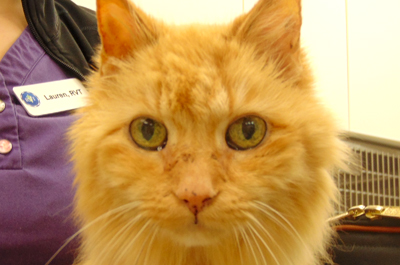Senior pet wellness is one of the most important areas where we can improve the quality of life of our pets. After the age of eight, regular examinations and wellness testing are extremely important and can play a large role in improving your senior pet’s overall quality of life. Identifying problems early gives us the best chance of keeping your pet healthy long term. Pets are very good at hiding pain and discomfort so by checking their blood and urine we can catch any early changes.
At Martindale Animal Clinic your pet’s senior wellness is as important to us as it is to you, which is why we recommend that we see your healthy senior pet for an annual wellness visit. At this visit we will conduct a complete physical exam and also include any or all the following:
Physical Examination
Sometimes when older pets are slowing down their symptoms are misinterpreted as a regular part of aging. Often, however, your senior pet is slowing down due to a health concern that can be alleviated by your veterinarian. We feel it is important to provide your pet with a thorough physical examination at every visit. Your veterinarian will examine your pet’s ears, eyes, mouth, teeth, skin, fur, and palpate their abdomen to assess for lumps, fluid, or abnormal structures. They will also assess your pets chest and listen for heart murmurs, arrhythmias, and any abnormal lung sounds. Mobility, body condition, behavioral issues, appetite, energy level, and anything else you are concerned about will also be covered.
A few common health conditions commonly seen in older pets include arthritis, dental disease, under active thyroid glands, and kidney disease. All of these can be treated to improve your senior pets quality of life.
Canine Vaccines
We routinely vaccinate all dogs for Rabies, Distemper, Parvovirus, Hepatitis, and Leptospirosis. Where possible we use 3-year vaccines, so your dog may not receive all vaccines every year.
Distemper is a widespread and often fatal disease which can cause vomiting, diarrhea, pneumonia and neurological problems.
Parvovirus a highly contagious and potentially fatal disease which may cause severe vomiting and bloody diarrhea. It is especially dangerous in young dogs, but all unvaccinated dogs are at risk of contracting this serious infection.
Hepatitis is an adenovirus disease which may lead to severe damage of the liver, kidneys, spleen, and lungs.
Leptospirosis is a bacterial infection that may lead to permanent kidney and liver damage. Leptospirosis can be transmitted to humans. The bacteria is spread through contact with contaminated soil or water. The bacteria comes from the urine of wild life.
Rabies is a fatal infection of the central nervous system. The virus is transmitted through the bite of an infected animal. Rabies vaccination is required by law for all dogs and cats due to human health risk.
Lyme Disease and Bordetella are diseases we vaccinate dogs for if their lifestyle dictates they are at risk.
Lyme Disease is transmitted through ticks and it infects both humans and dogs. This disease can damage joints, causing fever and lameness. A small portion of dogs can develop a fatal kidney disease.
Bordetella aka Canine cough is a highly contagious respiratory disease that causes cold or flu like symptoms. Canine cough can be transmitted by casual contact such as sniffing each other when on a walk, playing, or sharing water dishes. Bordetella vaccination is usually mandatory at boarding facilities. It is recommended to get the Bordetella vaccine if your dog goes to regular grooming, dog park, boarding facilities, or in general comes in contact with a lot of dogs. We routinely vaccinate all puppies for canine cough.
Feline Vaccines
We routinely vaccinate all cats for Feline Viral Rhinotracheitis, Calicivirus, Panleukopenia, Feline Leukemia, and Rabies. Where possible we use 3 year vaccines, so your cat may not receive all vaccines every year.
Feline Viral Rhinotracheitis (FVR) is a common herpes virus that causes sneezing, decreased appetite, nasal congestion, red runny eyes, and fever. These can be recurring or chronic in some cats.
Calicivirus also causes upper respiratory infections and can be especially debilitating in young cats. It can cause ulcers in the mouth leading to decreased ability to eat.
Panleukopenia is a virus that causes vomiting and diarrhea, it also suppresses the bone marrow and affected cats often don’t survive.
Feline Leukemia is a slow acting retrovirus. If is transmitted through fighting, grooming, contact with body fluids, or from mother to kitten. Over time it can cause immune suppression and certain fatal cancers, including Leukemia and Lymphoma. Effects from this virus are often not seen for months to years after exposure.
Rabies is a fatal infection of the central nervous system. The virus is transmitted through the bite of an infected animal. Rabies vaccination is required by law due to human health risk. Even indoor cats are at risk of Rabies exposure, in the case they ever get outside or wildlife, especially bats, enter your home.
Senior Wellness Blood Testing
We recommend this blood testing for all dogs and cats annually in order to identify any diseases or areas of concern before they become apparent clinically. Identifying problems early gives us the best chance of keeping your pet healthy long term. Pets are very good at hiding pain and discomfort so by checking their blood and urine we can catch any early changes. Senior Wellness testing includes a CBC (complete blood cell count) to look for changes in the red blood cells, white blood cells or platelets that can signify disease, a blood chemistry profile checking proteins, electrolytes, blood sugar, and a more detailed assessment of the liver and kidneys. Thyroid hormone levels are also assessed, as it is relatively common in older pets to have lower or higher hormone levels, which can indicate an under or over-functioning thyroid gland or other illness. We will also collect and evaluate a urine sample. These tests help us detect illness that your pet simply can’t tell you about. However, the good news is your pet can usually let you know they appreciate their improved quality of life through their increased energy and return to old habits.
Heartworm and Tick Disease Screening
Heartworm and tick disease screening is done yearly by taking a small blood sample from your dog. Heartworm and Tick disease screening is necessary for all dogs, even ones that spend most of their time indoors. This screening test looks for Heartworm disease, Lyme disease, Anaplasma and Ehrlichia. Lyme disease, Anaplasma and Ehrlichia are bacteria transmitted by ticks that can affect your dog’s blood cells, internal organs, and immune system. Symptoms for these infections are lameness, fever, lack of energy, loss of appetite, vomiting, and diarrhea. Heartworm is transmitted by mosquitos. They are long worms that live in the blood vessels surrounding the heart. Many dogs with heartworm disease show no symptoms until it is too late and heart disease develops. Some heartworm prevention products can actually be dangerous for your dog if they already have Heartworm disease. Preventing heartworm disease is much easier and cheaper than treatment! There are resistant strains of heartworm coming up from the Southern United States, so testing is very important, even for pets who have been on prevention products regularly.
For more information on Heartworm disease, Lyme disease, Anaplasma, and Ehrlichia please click here.
Fecal Parasite Screen
Fecal parasite screens should be done at least once a year for your cat or dog. We look at your pets stool sample under the microscope and are searching for parasite eggs including Roundworms, Hookworms, Tapeworms, and Whipworms. We are also examining for protozoan parasites (single celled organisms) such as Coccidia and Giardia. Dogs and cats will get these parasites from the ground (dirt/grass/sidewalks) where they walk, fleas, hunting, drinking from outdoor water sources, or contact with the stool of other animals. Indoor cats can get parasites too; we can track eggs in on our shoes, dirt in potted plants can be infested, they can hunt rodents indoors, and can even get fleas that hitchhike in from outside! Did you know many pets with intestinal parasites do not show any outward symptoms? Parasites affect their health in less-obvious ways including poor growth, poor haircoat, weakened immune system, and some can infect people. If your dog or cat is having diarrhea or other intestinal issues more extensive testing may be recommended. If the stool sample tests positive, appropriate deworming medication will be prescribed.
Heartworm, Tick, Flea and Intestinal Parasite Prevention
There are a wide range of products available, most are administered once per month either orally or topically. We will help you choose the best product for your pet based on their lifestyle and your preferences. Heartworm prevention season is June-November, but flea and tick season can be much longer depending on the weather. Fleas will survive indoors and on other animals during the winter, and ticks are active if it is >4 oC outside. Intestinal parasite eggs can be present in the soil year-round.
Outdoor cats, semi-outdoor cats, or cats who hunt should be given monthly flea and intestinal parasite prevention. Also, every few months they should receive a product to deworm for tapeworms. Did you know that indoor cats can get fleas too? We can bring fleas into our homes from outside so it is important to be protecting our indoor kitties too.
We feel that one of the most important parts of an examination and visit is ensuring that all of your questions are answered. Call us today (905) 682- 5551 or click here to book an appointment for a senior wellness examination and help keep your pet healthy!




Serving St. Catharines and Niagara Region